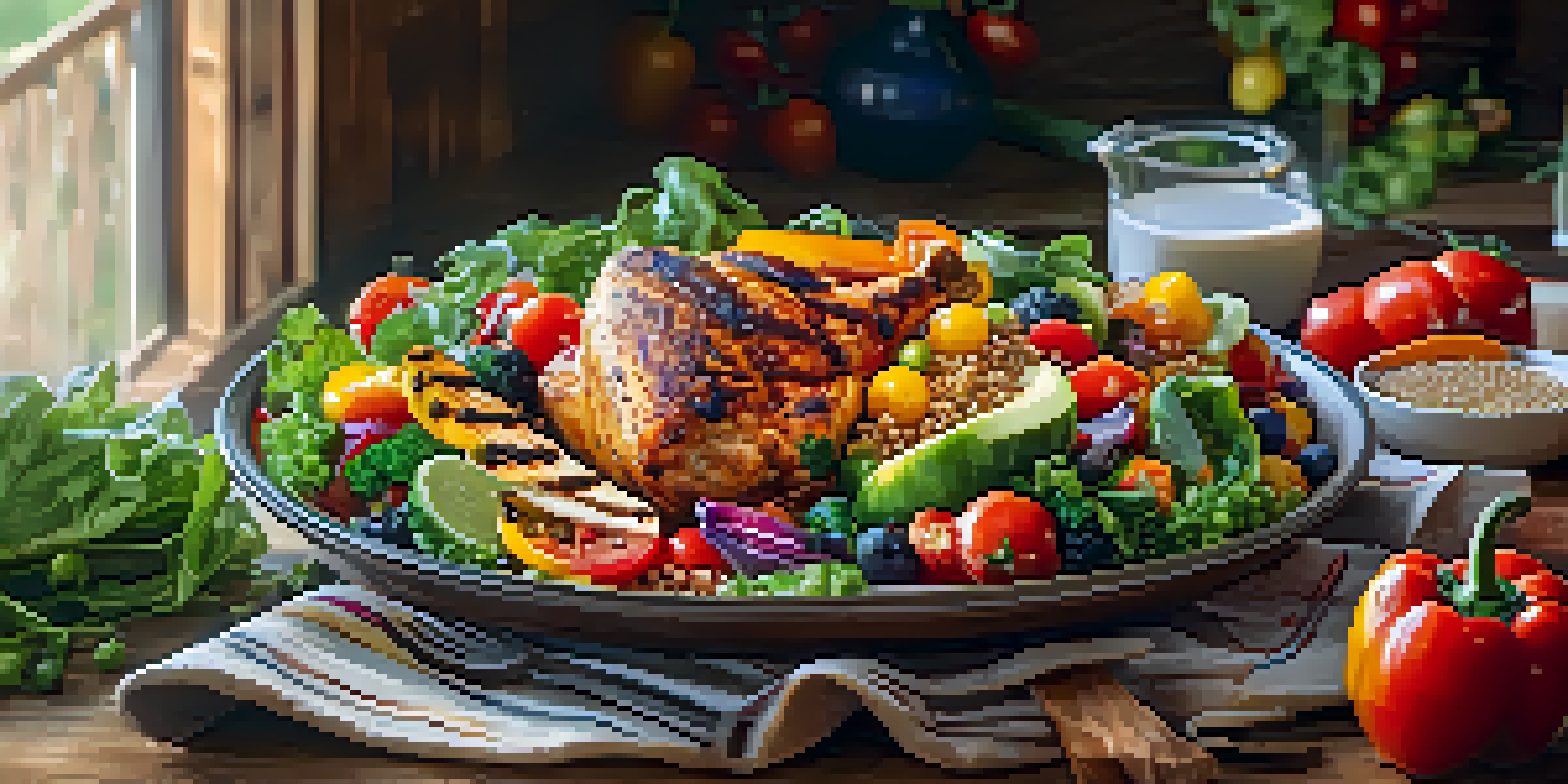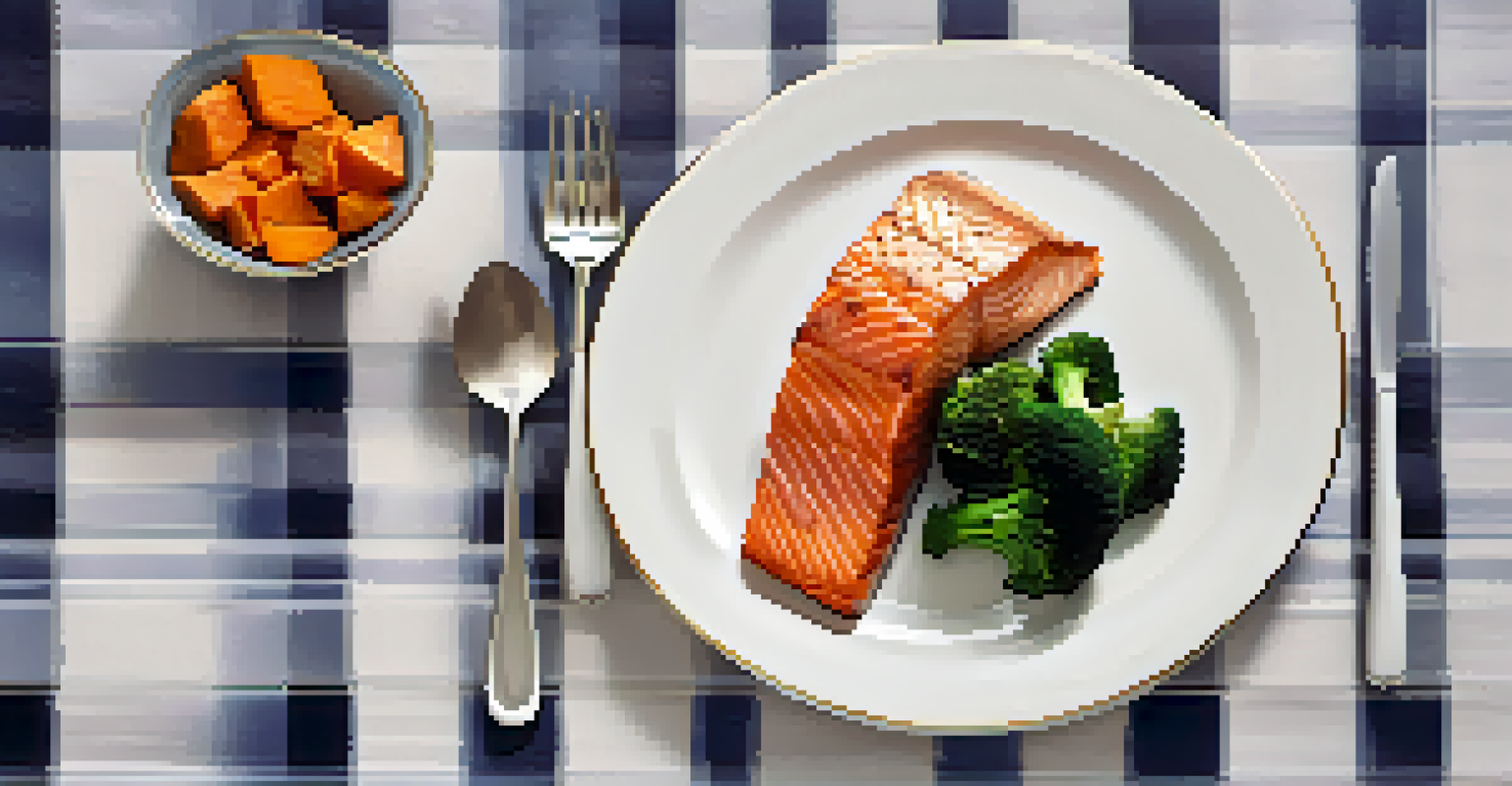Building a Balanced Plate for Athletic Training

Understanding the Basics of a Balanced Plate
A balanced plate is essential for athletes, as it provides the necessary nutrients for optimal performance. Think of your plate as a canvas where each food group adds color and vitality to your meal. The goal is to incorporate a variety of foods that fuel your body, support recovery, and enhance overall health.
Let food be thy medicine and medicine be thy food.
Each meal should ideally include carbohydrates, proteins, and fats, along with vitamins and minerals. Carbs are your primary energy source, proteins are vital for muscle repair, and healthy fats help with hormone regulation and inflammation control. This balanced approach ensures your body gets everything it needs to thrive during training.
To visualize this, consider the classic plate model: half your plate should be filled with fruits and vegetables, a quarter with lean protein, and the remaining quarter with whole grains. This simple structure can help you assemble meals that are not only delicious but also tailored to support your athletic goals.
Carbohydrates: The Fuel for Your Workouts
Carbohydrates often get a bad rap, but they are crucial for athletes. They act as the primary energy source that powers your workouts and aids in recovery afterward. When you consume carbs, your body converts them into glucose, which your muscles use for fuel, especially during high-intensity training.

Including a variety of carbohydrate sources can enhance your performance. Whole grains, fruits, and vegetables are excellent choices that offer fiber, vitamins, and minerals. For instance, oatmeal, brown rice, and sweet potatoes not only provide energy but also sustain you longer during training sessions.
Balanced Plate Fuels Performance
A balanced plate with carbohydrates, proteins, and fats is essential for athletes to optimize performance and recovery.
Timing your carbohydrate intake is just as important as the quantity. Consuming carbs before a workout can boost your energy levels, while having them afterward helps replenish glycogen stores. A banana or a slice of whole-grain toast before hitting the gym makes a world of difference!
Proteins: Essential for Recovery and Muscle Growth
Proteins play a crucial role in muscle repair and growth, making them a vital component of an athlete's diet. After an intense workout, your muscles need protein to recover and rebuild stronger. Think of protein as the building blocks that help your body bounce back from training.
You are what you eat, so don’t be fast, cheap, easy, or fake.
Good sources of protein include lean meats, fish, dairy, legumes, and plant-based options like tofu and quinoa. For instance, a grilled chicken breast or a serving of Greek yogurt can effectively support your recovery process. Aim for a variety of protein sources to ensure you're getting a mix of amino acids, the building blocks of protein.
It's also essential to spread your protein intake throughout the day. Instead of loading up on protein in one meal, try to incorporate it into each meal and snack. This approach not only aids recovery but also keeps you feeling full and satisfied.
Healthy Fats: An Overlooked Necessity
Healthy fats are often misunderstood but are a necessary part of your balanced plate. They provide energy, support cell growth, and help your body absorb essential vitamins. Including fats in your diet can also aid in reducing inflammation, which is particularly important for athletes.
Sources of healthy fats include avocados, nuts, seeds, and olive oil. For example, adding a handful of walnuts to your salad or drizzling olive oil over your veggies can enhance both the flavor and nutritional value of your meals. These fats not only taste great but also offer numerous health benefits.
Hydration Supports Athletic Goals
Proper hydration is crucial for athletes, impacting everything from nutrient transport to temperature regulation during training.
Balancing your fat intake is key; aim for unsaturated fats while limiting saturated and trans fats. By choosing whole food sources of fats, you can nourish your body without sacrificing taste or health. Remember, moderation is essential; a little goes a long way!
Vitamins and Minerals: Micronutrients Matter Too
While macronutrients like carbs, proteins, and fats get most of the attention, vitamins and minerals are equally important for athletic performance. These micronutrients support various bodily functions, from energy production to muscle contraction. Without adequate vitamins and minerals, your body may not perform at its best.
Fruits and vegetables are your best friends when it comes to these essential nutrients. Brightly colored produce often indicates a wealth of vitamins and minerals. For instance, spinach is rich in iron, which is crucial for oxygen transport in the blood, while berries provide antioxidants that help combat exercise-induced oxidative stress.
Incorporating a variety of colorful fruits and vegetables into your meals can help ensure you’re meeting your micronutrient needs. Think of your plate as an artist's palette – the more colors, the more nutrients you’re likely to include, leading to better performance and recovery.
Hydration: The Key to Performance
Hydration is often overlooked, yet it's a critical aspect of athletic training. Water plays a vital role in almost every bodily function, including temperature regulation and nutrient transport. When you’re training hard, staying hydrated can be the difference between feeling great or hitting a wall.
It's important to drink water throughout the day, especially before, during, and after workouts. As a rule of thumb, aim for at least half your body weight in ounces of water daily. For example, if you weigh 150 pounds, try to drink at least 75 ounces of water each day – more if you’re sweating heavily during training.
Meal Timing Enhances Recovery
Eating at the right times, particularly before and after workouts, can significantly improve energy levels and muscle recovery.
In addition to water, consider incorporating electrolyte-rich beverages after intense workouts. These drinks can help replenish essential minerals lost through sweat, aiding in recovery and keeping your performance at peak levels. Remember, hydration is not just about quenching your thirst; it’s about supporting your body’s needs.
Meal Timing: When to Eat for Optimal Performance
Meal timing can significantly impact your athletic performance and recovery. Eating at the right times can help fuel your workouts and enhance recovery afterward. A well-timed meal can mean the difference between feeling energized or fatigued during training.
Try to have a balanced meal containing carbs and protein about 2-3 hours before your workout. This allows your body time to digest and convert the food into energy. For example, a bowl of oatmeal with fruit and nuts is a great pre-workout option that provides lasting energy.

Post-workout, aim to refuel within 30 minutes to two hours. This is when your muscles are most receptive to nutrients. A smoothie with protein powder, banana, and spinach can be a quick and effective way to replenish and repair your muscles after intense training.
Putting It All Together: Sample Balanced Plates
Now that you understand the components of a balanced plate, let’s put it all together with some examples. A sample breakfast may include scrambled eggs with spinach and whole-grain toast, providing a great mix of protein, healthy fats, and carbs. This meal sets a positive tone for the day ahead.
For lunch, consider a quinoa salad with chickpeas, mixed greens, cherry tomatoes, and avocado. This colorful dish is rich in vitamins, protein, and healthy fats, keeping you energized and satisfied. Don’t forget to include a piece of fruit for that extra micronutrient boost!
Dinner could feature grilled salmon, sweet potato, and steamed broccoli. This meal offers a perfect balance of protein, healthy fats, and carbohydrates, while also being packed with vitamins and minerals. By varying your meals and including diverse ingredients, you can create a sustainable and enjoyable nutrition plan that supports your athletic training.